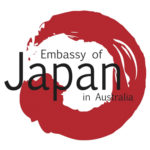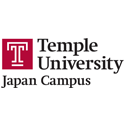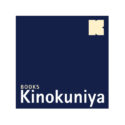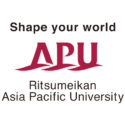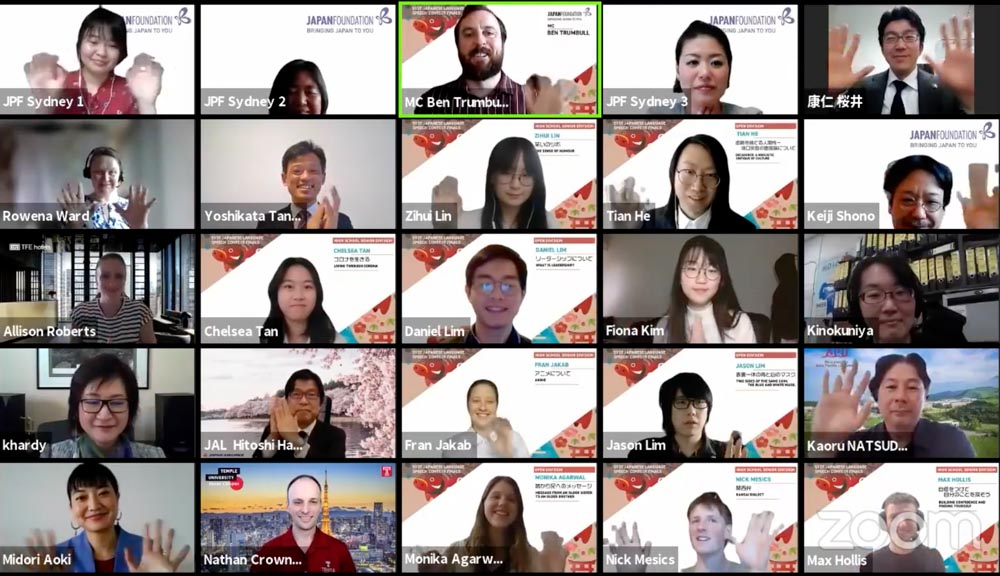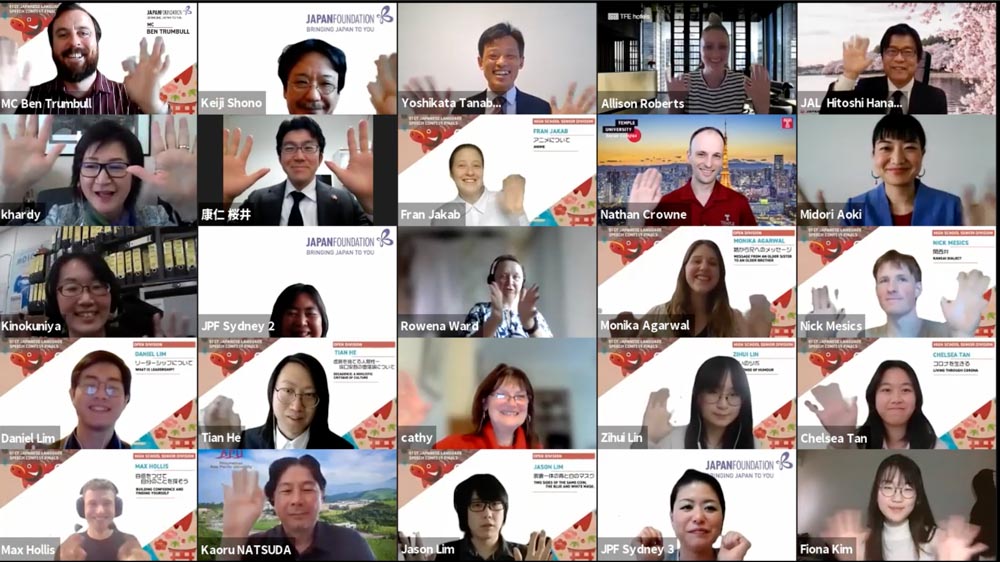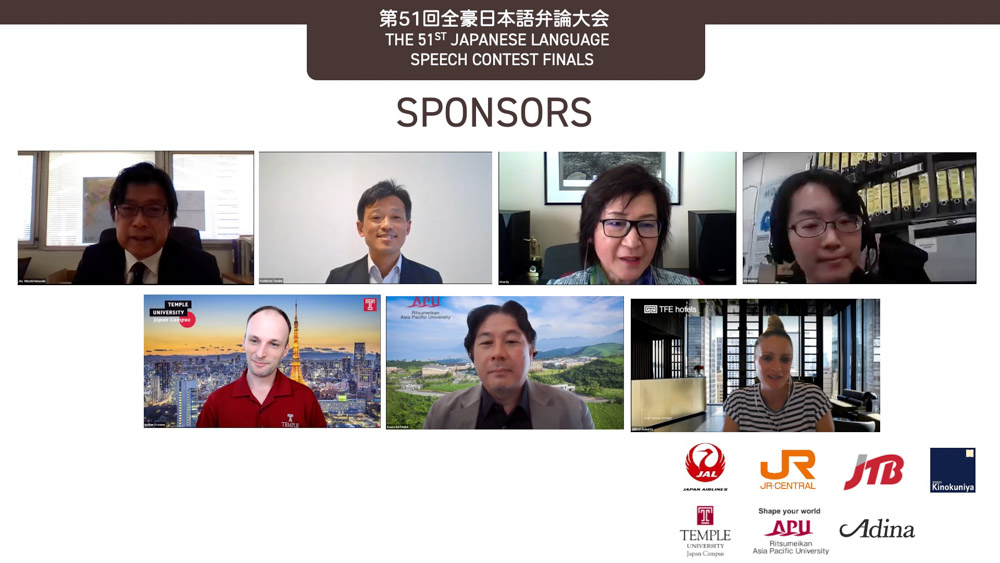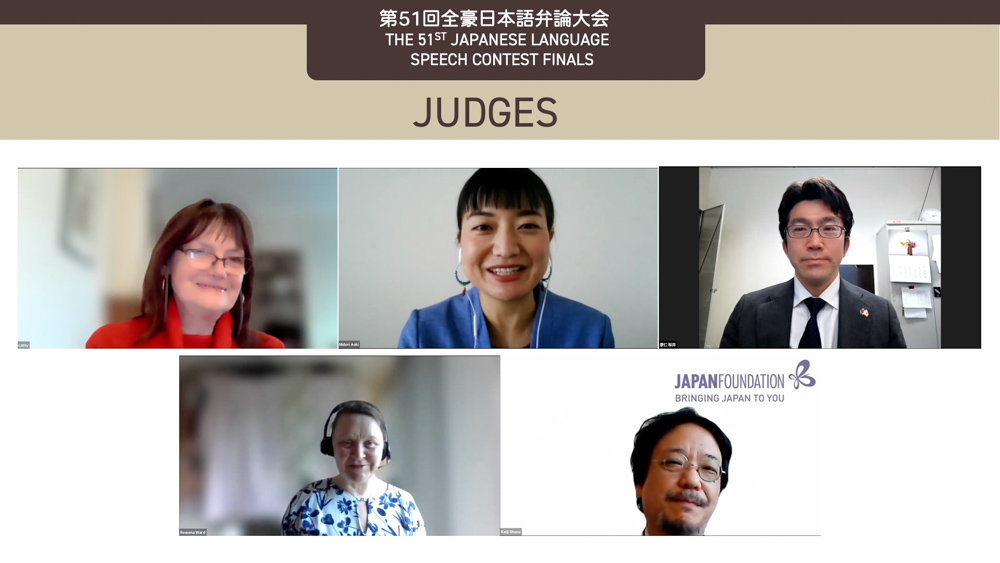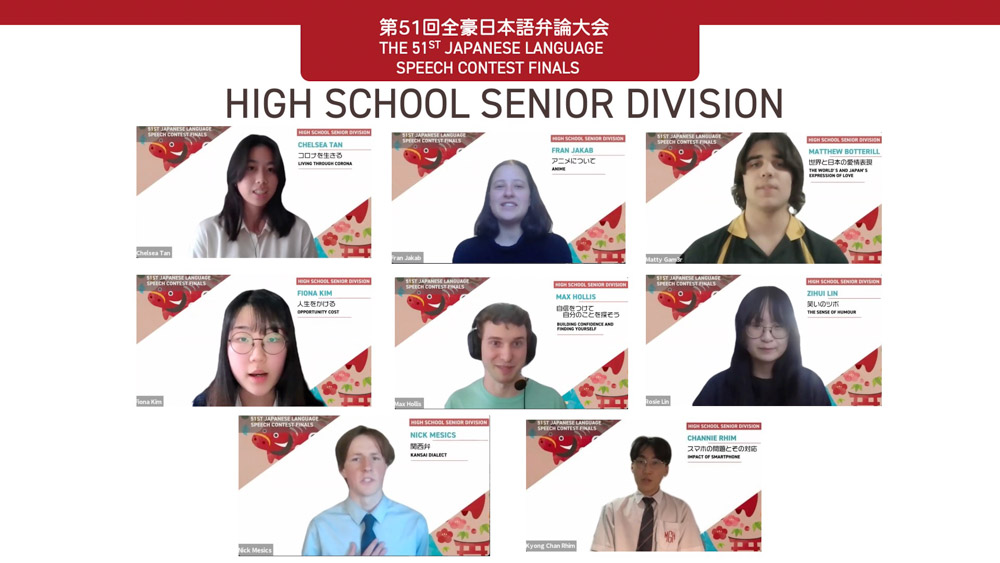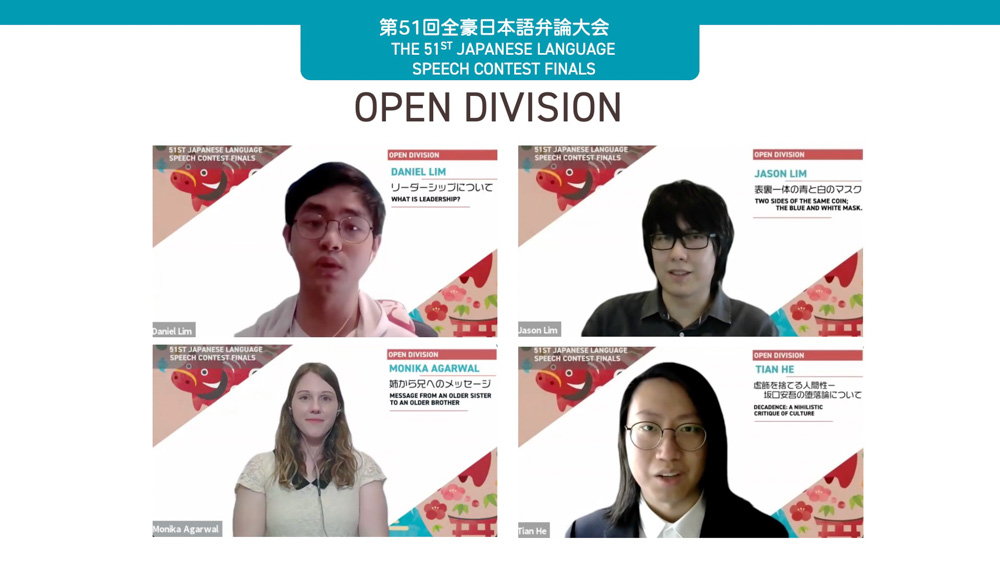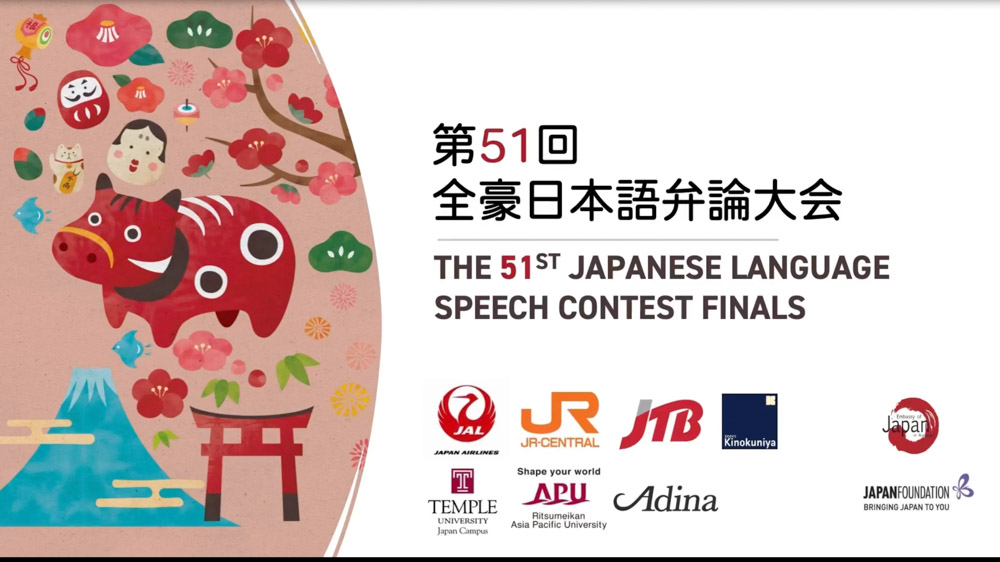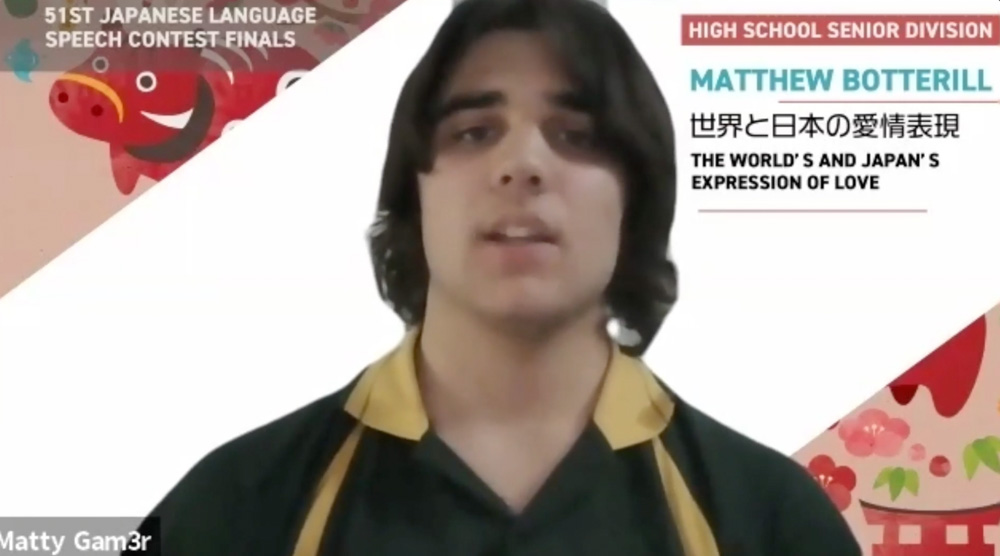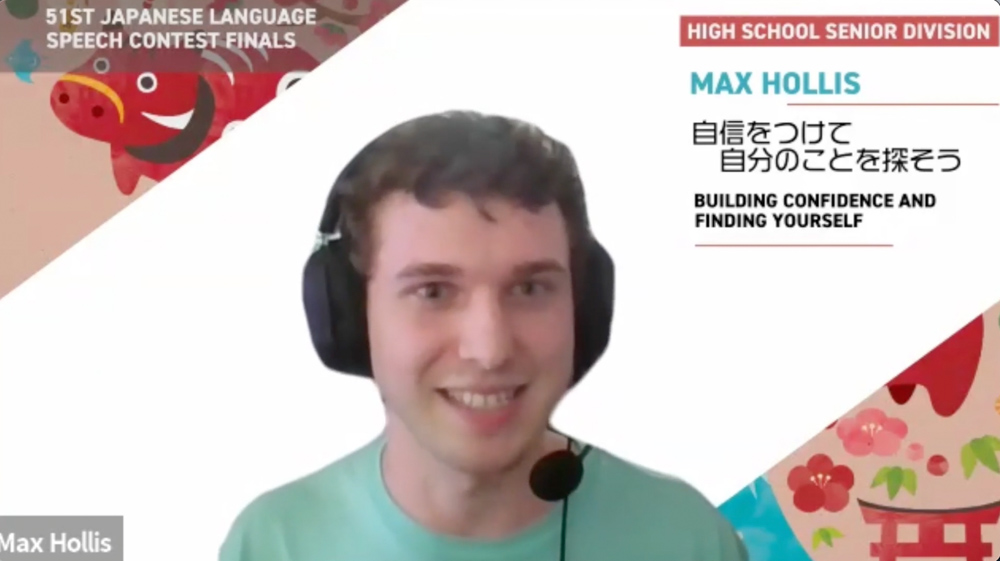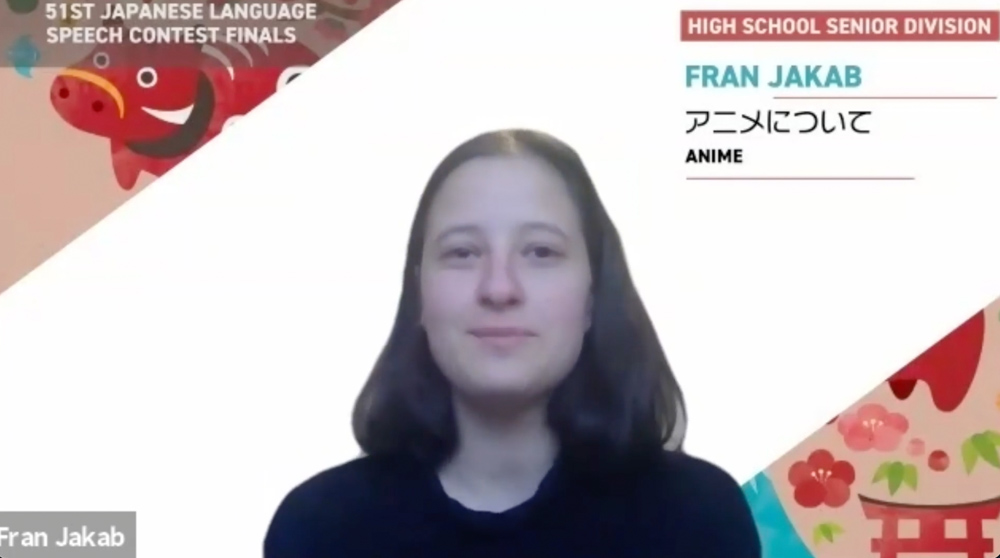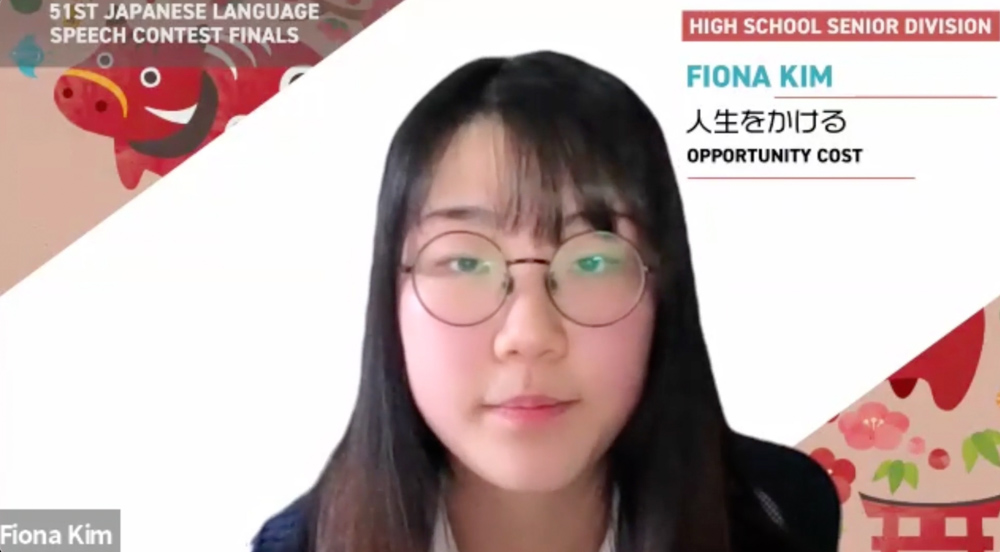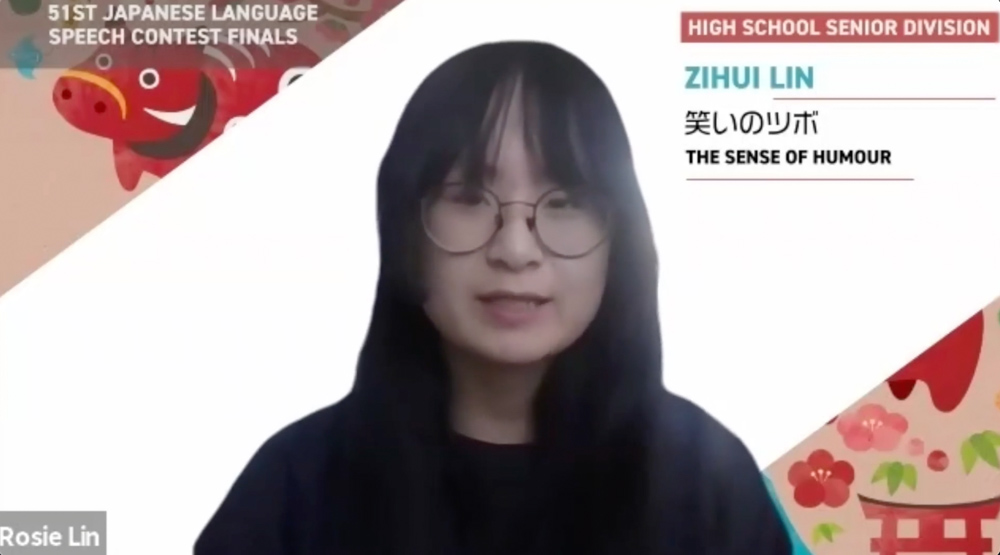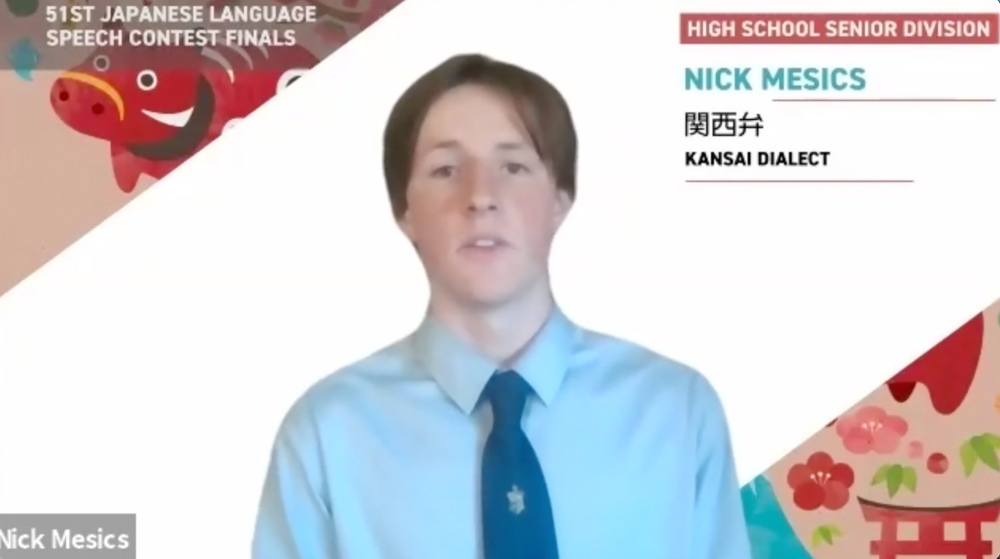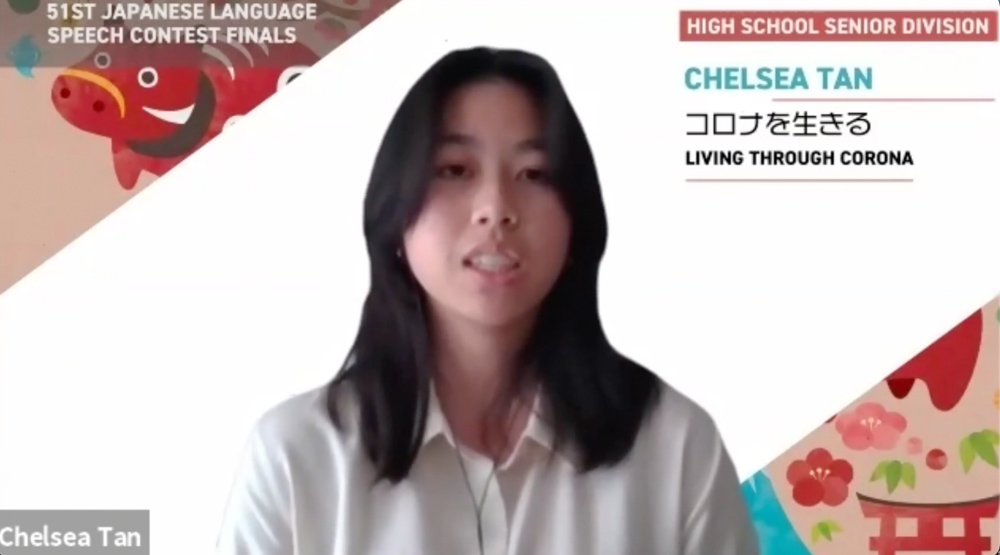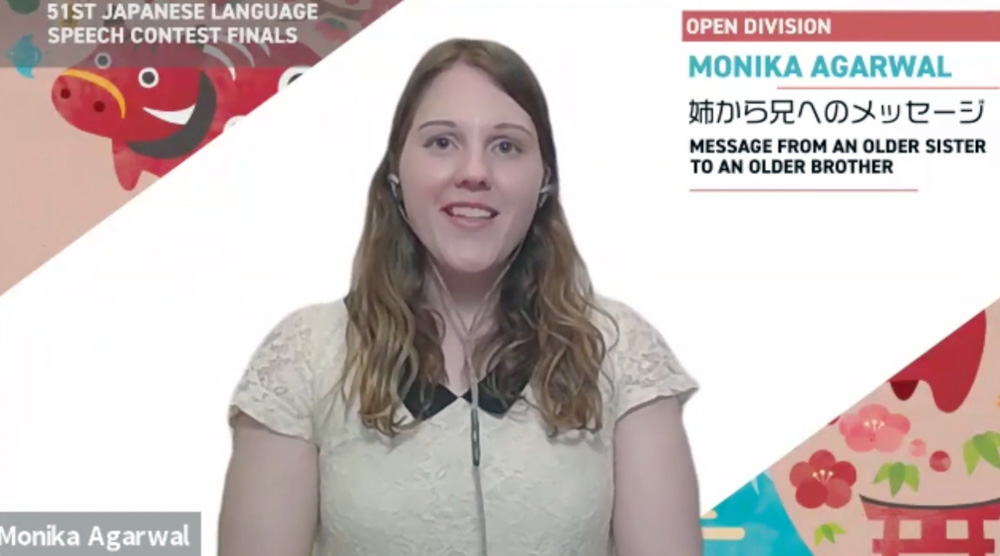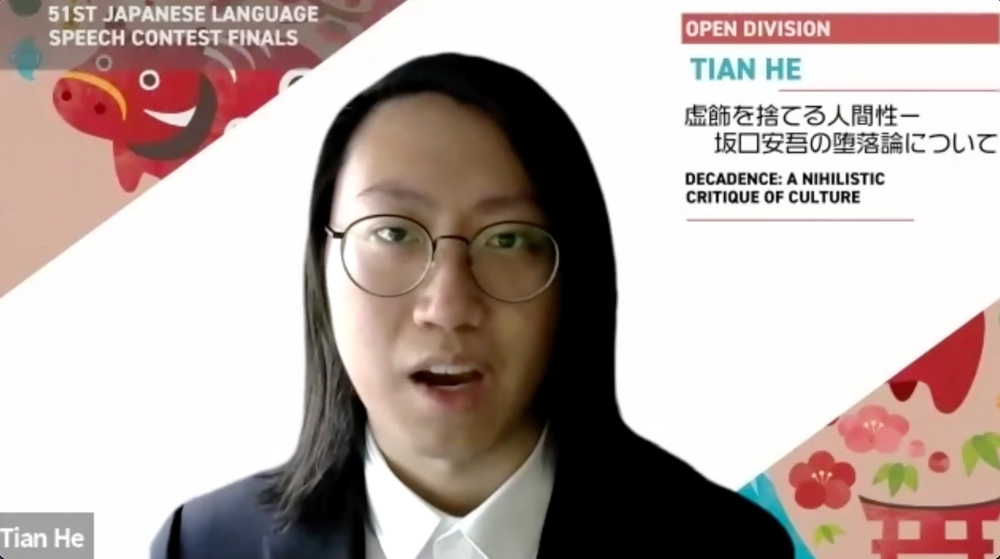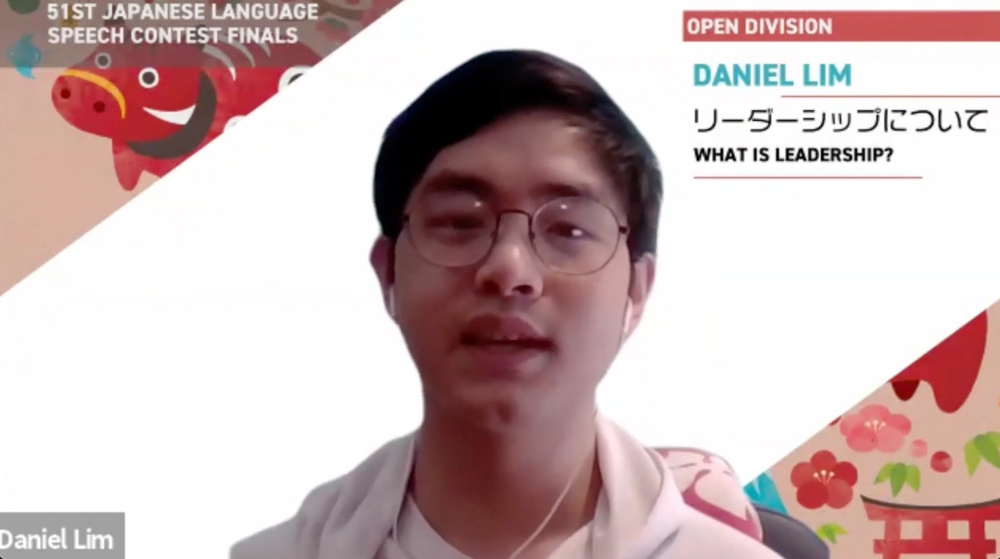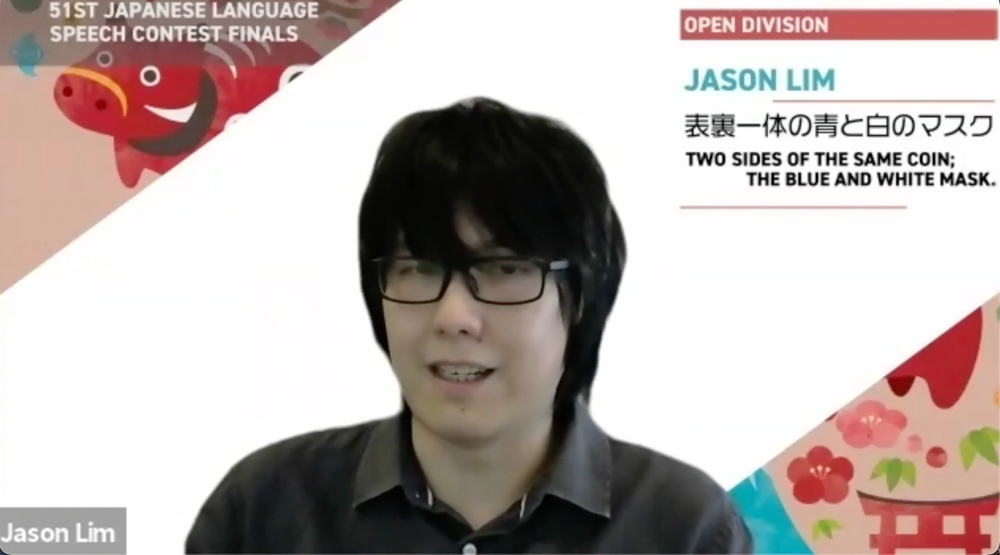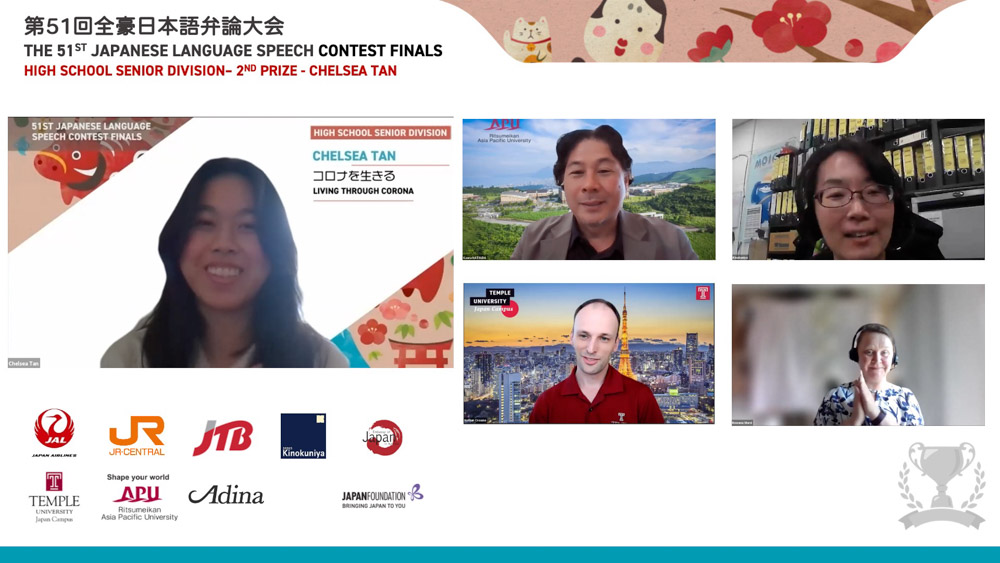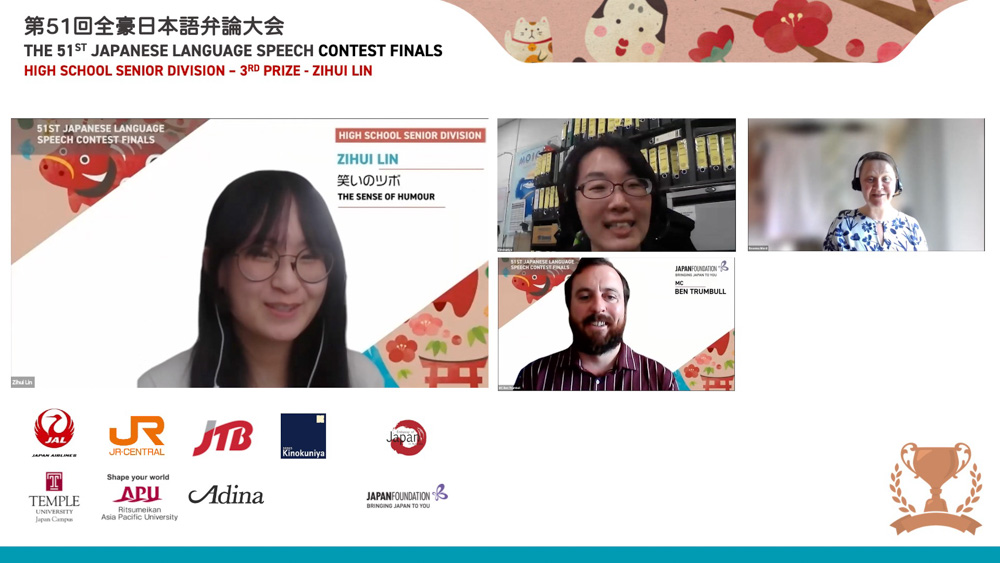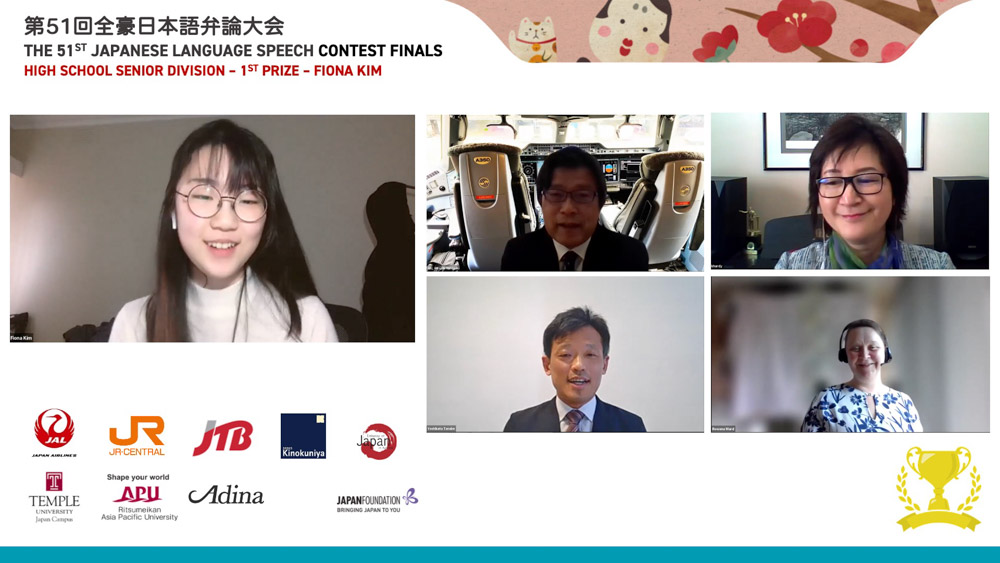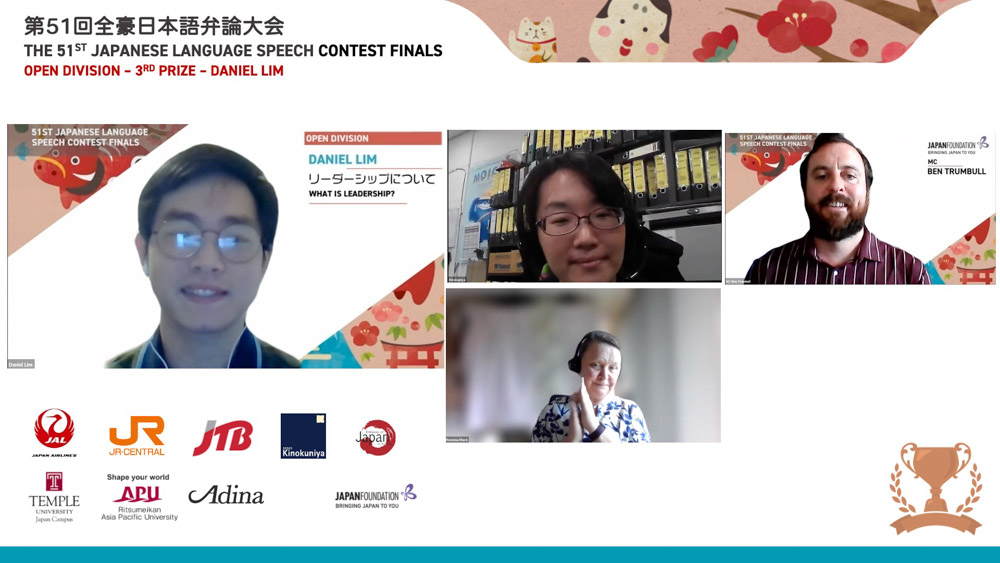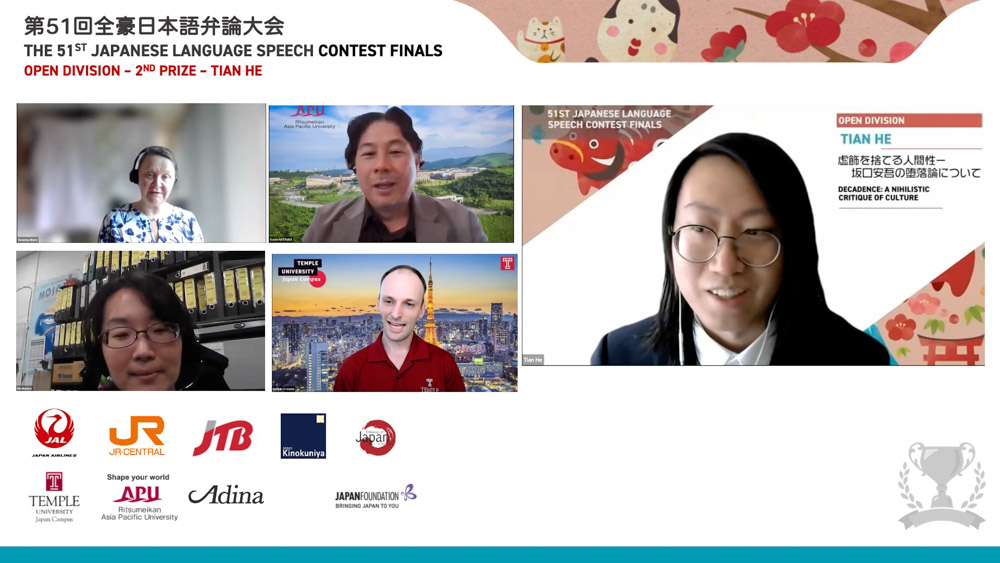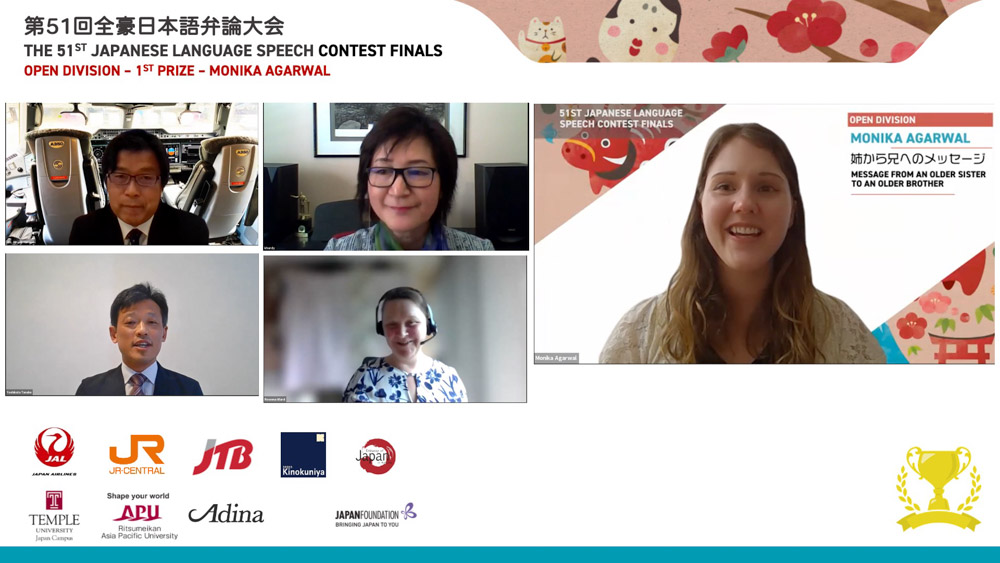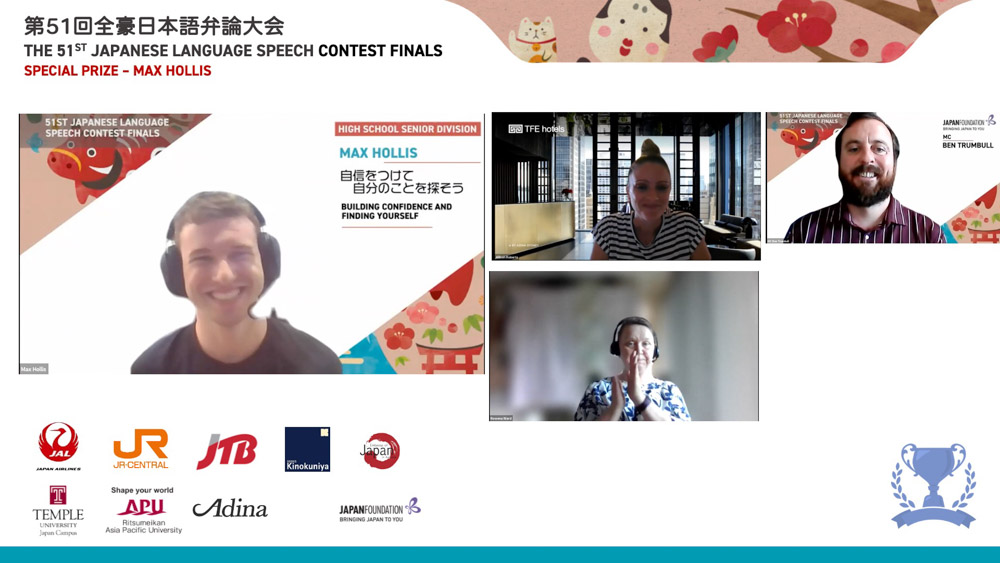
53rd Japanese Language Speech Contest Finals
The Australian Japanese Language Speech Contest Finals finished its long history in 2023. Thank you for the great support for so many years. From 2024, some state/territory level may continue to their contests. If you are interested in participating in those contests, please contact the organisers in your state. Thank you very much!
The 53rd Australian Japanese Language Speech Contest Finals was held by video entries from the state/territory level contest winners in the following two divisions.
- High School Senior Division
- Open Division
*Please be kindly informed that 2023 National Speech Content will be the final one in its current format.
The Japan Foundation, Sydney is currently working on launching a new presentation-based contest from 2024, which will be independent of the State/Territory level contests. For information of the State/Territory level Speech Contest from 2024, please contact the respective organiser directly.
Ambassador SUZUKI’s Message
 Thank you for the opportunity to provide a message for the final of the 53rd Japanese Language Speech Contest.
Thank you for the opportunity to provide a message for the final of the 53rd Japanese Language Speech Contest.
I assumed the role of Ambassador only four months ago, and already I am impressed by the level of Australians studying Japanese.
I would like to congratulate you on progressing to the national finals by excelling at the state and territory contests. I would like to thank all participants of speech contests around Australia, and acknowledge the hard work of the event organisers.
I believe this speech contest is as much about expressing yourself as it is about showcasing your language skills. I commend you for your courage in sharing your stories, and for challenging yourself by doing so in another language.
Moreover, Japanese language learning in Australia – which has the most Japanese learners per capita – is a fundamental element of our relationship, strengthening our friendship and mutual understanding.
I wish the competitors all the best for the finals. I have no doubt that this year’s contest will be another great success.
SUZUKI Kazuhiro, Embassy of Japan in Australia
2023 Judges
| Xiangdong Liu | Western Sydney University |
| Yumiko Shaw | Finigan School of Distance Education |
| Hitoshi Hanasaki | Japan Airlines Co. Ltd. |
| Yasuhito Sakurai | Embassy of Japan in Australia |
| Yukihiro Ohira | The Japan Foundation, Sydney |
2023 Prizes
| 1st Prize | 
Middle and right images: © Kyoto Tourism Council
Return air ticket to Japan (Sydney/Melbourne to Tokyo) courtesy of Japan Airlines 7-day Japan Rail Pass courtesy of Central Japan Railway Company |
| 2nd Prize | $200 prepaid Gift Card courtesy of Temple University Japan Campus
$200 prepaid Gift Card courtesy of Ritsumeikan Asia Pacific University |
| 3rd Prize | $200 voucher courtesy of Kinokuniya Bookstore of Australia
Special leather compendium and stationery set courtesy of JTB Australia |
| Special Prize | Overnight accommodation for two in Australia courtesy of TFE Hotels, valued at $500 |
Japan Airlines (JAL)
JR-Central
2023 List of Contestants
The state/territory level contests were held between July and early September. Below is the list of the contestants in High School Senior Division and Open Division who are representing their state/territory at the Australian Japanese Language Speech Contest this year. (Alphabetical order)
High School Senior Division
| Micah Anden | Casuarina Senior College, NT |
| Jyothika Cheerath | Queensland Academy for Science, Mathematics and Technology, QLD |
| Sidney Eric | Perth Modern School, WA |
| Jasper Hui | Xavier College, VIC |
| Eunbi (Christine) Kang | Cumberland High School, NSW |
| Maryam Khan | Narrabundah College, ACT |
| Akira Yianni | The Friends School, TAS |
Open Division
| Kaustav Bhowmick | Curtin University, WA |
| Olivia Chubb | University of New South Wales, NSW |
| Hakeem Dimozantos | Monash University, VIC |
| Sanle Yan | Australian National University, ACT |
Announcement Of The 2023 National Winners!
2023 High School Senior Division
The 1st Prize Winner’s Speech
The 2nd Prize Winner’s Speech
| Prize | Name | Speech Title |
| 1st | Maryam Khan (Narrabundah College, ACT) |
見逃しの恐れ Fear of Missing Out (FOMO) |
| 2nd | Jyothika Cheerath (Queensland Academy for Science, Mathematics and Technology, QLD) |
学校での携帯電話の禁止について Banning Mobile Phones in Schools |
| 3rd | Jasper Hui (Xavier College, VIC) |
コロナ禍でのマスク着用について思ったこと My Thoughts on the Usage of Masks During the Era of Covid |
Speech Summaries
見逃しの恐れ / Fear of Missing Out (FOMO)
In today’s society, with the increasing prevalence of social media, the phenomenon of ‘FOMO’ or ‘Fear of Missing Out’ is becoming more common than ever. FOMO is the anxiety caused by feeling like you are missing out on exciting events, or that your life is not as interesting and successful as others. In order to overcome FOMO, it is important to shift the focus from other’s lives to our own and be grateful for the many things that we currently have.
There is a common Japanese proverb ‘Ichigo Ichie’ that means to cherish the unrepeatable nature of a moment. I believe we should all live this way. Because when you ignore the present moment and think about what you could be doing, you miss out on whatever you actually are doing.
学校での携帯電話の禁止について / Banning Mobile Phones in Schools
Recently, the Queensland Government decided to implement a state-wide ban on all mobile phones in State Schools effective from next year. This ban does not extend to ‘non-government’ schools, but its approach has nonetheless sparked some conversation around this topic. Currently, all other Australian states (with the exception of ACT) have also banned the usage of phones in schools. However, with the implementation of more and more technology within teaching, learning and life in general, rather than a blanket ban shouldn’t the benefits of the usage of phones be weighed against the negatives? Current issues like ‘Digital distraction’ and ‘Cyber-bullying’ most definitely cannot be solved with a blanket ban, however, doing so rids students of their ability to be effective and efficient in their studies and school life. It also robs them of the opportunity to preserve and share memories of one of the most cherished epoch of their lives.
コロナ禍でのマスク着用について思ったこと/ My Thoughts on the Usage of Masks During the Era of Covid
During Covid around the world, there was an increase in the usage of masks in response to the global impact of Covid. While people in Japan wore masks immediately without questioning, many people in Australia initially showed resistance. The pandemic eventually subsided, and mask mandates were lifted. However, despite the lifting of mandates, most people in Japan continue to wear masks due to different factors. In particular, the influence of “conformity pressure”, the pressure to do as others do, mobilized the people in Japan to wear masks as those around them do so. On the other hand, the conformity pressure in Australia is different to Japan, where wearing a mask is considered strange. Hence, through the contrast between conformity pressures, I’d like to reflect on different forms of conformity pressure throughout my life and highlight the importance of not losing one’s true self despite submerging in different cultures and customs.
Comment from the Judges
On behalf of the judging panel, I would like to congratulate all the finalists and thank all the contestants for participating! We enjoyed listening to the high-quality speeches and were impressed by each finalist’s speech delivery. The speeches made us rethink critical societal issues, such as how to save the environment and animals and what the internet and mobile phones mean to us. Listening to the speeches, we received and felt the finalises’ enthusiasm toward their strong messages: we must live an authentic life, treasure every moment, value our individuality, think for ourselves, and pursue our dreams persistently. We know that all these highly admirable finalists’ speeches result from significant time and effort. We hope the experience of participating in this speech contest will mark a new starting point in your learning journey and bring you further success! (Xiangdong Liu)
2023 Open Division
The 1st Prize Winner’s Speech
The 2nd Prize Winner’s Speech
| Prize | Name | Speech Title |
| 1st | Hakeem Dimozantos (Monash University, VIC) |
隠された道を見つける Find the Hidden Path |
| 2nd | Sanle Yan (Australian National University, ACT) |
京都から版画へ:私が感じた日本 From Kyoto to Woodcut: My Impression of Japan |
| 3rd | Olivia Chubb (University of New South Wales, NSW) |
女子エンジニアの夢と挑戦 The Dreams and Challenges of a Female Engineer |
Speech Summaries
隠された道を見つける / Find the Hidden Path
Have you ever been told you’re something, and eventually, you believed it? I was labelled ‘shy’ as a child, and I unconsciously embraced that label. As a result, I conformed to expectations, choosing the comfort of blending in over standing out. Like many, I found myself drifting through life on autopilot, following a path already laid out by others, the only one I thought existed. But this path, I realised, led to missed opportunities, friendships left unformed, and happiness left unexplored. From travelling in Japan, arose an experience that was able to serve as a metaphor for life. Revealing hidden paths obscured by self-bias. Guiding me to step into discomfort, compelled by optimism for what lies ahead.
京都から版画へ:私が感じた日本 / From Kyoto to Woodcut: My Impression of Japan
In my speech, I will reflect on my experience as an exchange student living in Kyoto, where I have observed a unique and beautiful coexistence of tradition and modernity. Based on this personal experience, I will draw parallels between Kyoto and the evolution of Japanese printmaking. As ukiyo-e faced a decline due to Western influences in the late nineteenth century, Japanese printmakers adapted to Western standards, giving rise to the “Shin-Hanga” and “Sōsaku-Hanga” movements. They skillfully integrated Western painting techniques and forms while diligently preserving the rich tradition of Japanese printmaking. By sharing my appreciation of Kyoto and Japanese printmaking, which together shaped my impression of Japan, I aim to convey the idea that one should embrace change with a positive attitude, while maintaining their unique traits during turbulent times.
女子エンジニアの夢と挑戦 / The Dreams and Challenges of a Female Engineer
Today, traditional gender roles and expectations are being challenged, allowing individuals to pursue their passions and ambitions regardless of gender. While men still constitute the majority in engineering, the presence of women in this field is growing, and they are increasingly accepted and encouraged.
Initially, engineering seemed like an unusual choice for me, as I struggled with maths and science in school, and many had reservations about my decision to enter this challenging, male-dominated field. However, I made the choice to follow my passion for engineering. My story emphasises that individuals should not let gender or societal norms dictate their career choices. I share my journey of working hard to overcome challenges in pursuing engineering, alongside my brother’s pursuit of art, to illustrate how following one’s passion leads to a fulfilling life. I encourage everyone to have the courage to chase their dreams, regardless of the challenges they may face.
Comment from the Judges
The speeches of the Open Division presented the finalists’ broad and in-depth visions on various topics, from the importance of maximising our potential in life to Japanese woodcuts and the challenges a woman engineer faces. The speeches were all very well structured, highly logical and persuasive. More importantly, they all connected to the finalists’ own experiences and views, making their arguments impressive and compelling. The judges all commended the finalists for their advanced Japanese language skills. While discussing the complicated matters, all the speeches developed smoothly, conveyed the messages clearly and captivated the audience. We want to congratulate everyone for your achievement and believe you will find your path, face new challenges positively in the changing world, and make your dreams come true! (Xiangdong Liu)
2023 Special Prize
Sponsored by TFE Hotels
| Name | Speech Title |
| Kaustav Bhowmick (Curtin University, WA) | シーシュポスと不条理な英雄 Sisyphus and the Absurd Hero |
Speech Summary
シーシュポスと不条理な英雄 / Sisyphus and the Absurd Hero
The story of Sisyphus is the tragic comedy of a king who, for the crime of escaping death, was punished to push a cursed boulder up a hill forevermore. This story reverberated strongly within me and made me realise that we all are living lives like that of Sisyphus. In my speech, I discuss how we can find happiness in a world without any apparent meaning, by confronting the absurdity of our lives. By the end of my talk, I endeavour describe what it means to be an absurd hero.
Comment from the Judges
All the judges found this speech unique and fascinating. It is a philosophical discussion of life starting with the story of Sisyphus. We learned from this speech that even something absurd could appear meaningful when we look at it from a different angle and that we will all find happiness, no matter how challenging the situation is, if we have a positive attitude. This speech’s unique approach, creative viewpoints, and original ideas absorbed all the judges. Thank you, Kaustav-san, for this interesting speech! (Xiangdong Liu)
Japan Trip Report by the 2021 Open Division Winner, Monika Agarwal (VIC)
 In March 2023, thanks to the generosity of the sponsors of the Japanese Speech Contest, I finally returned to Japan after almost five years. This time was special because my mum joined me on this trip, and it was her first time in Japan. It was a perfect time to visit because the cherry blossom season just started, and we observed little buds turning into beautiful cherry blossoms throughout our trip.
In March 2023, thanks to the generosity of the sponsors of the Japanese Speech Contest, I finally returned to Japan after almost five years. This time was special because my mum joined me on this trip, and it was her first time in Japan. It was a perfect time to visit because the cherry blossom season just started, and we observed little buds turning into beautiful cherry blossoms throughout our trip.
My flight from Sydney to Tokyo, which was gifted by Japan Airlines, was very comfortable. I enjoyed all the meals, and the staff was extremely kind and helpful. I arrived at the Haneda airport in the late afternoon and made my way to the accommodation. I love Tokyo with all its neon lights, fancy restaurants, and cute cafes. There’s something in this city’s atmosphere that I want to keep coming back here, and I don’t even mind the crowds so much. I was really looking forward to returning after many years, seeing all my favourite places, and how the city has changed. However, the best part of coming back was visiting my friends whom I haven’t seen all these years. We spent hours talking, enjoying warm ramen, tempura, and sushi, and strolling around the streets of Tokyo with cherry blossoms starting to bloom. My mum joined me after a few days, and we visited Asakusa Shrine, Ueno Park, Shibuya Crossing, and also less popular places such as the Fabric Town in Nippori because we’re both into sewing. After a few days in Tokyo, we booked our tickets for Shinkansen using the JR Pass gifted by Central Japan Railway Co.. Our next stop was a place I always wanted to visit – Kyoto.

 Kyoto is now officially my favourite place in Japan! We spent there a week and saw most of the popular touristic places. The highlight of this trip was definitely the visit to the Fushimi Inari Taisha, where we climbed to the top through thousands of torii gates. Afterwards, we joined the wagashi sweets-making class followed by a tea ceremony, all while dressed in beautiful kimonos. I booked this experience through JTB Australia using the voucher that I received from JTB. I also used that voucher for a private walking tour from Kenninji Temple to the Nishiki Market. It was really nice to be guided by a local, especially, since my mom loves asking questions about every single building she sees. Eventually, after realising our guide is not in her 20s anymore, she started asking her about the Japanese secret of eternal youth, and how to stay slim (😅).
Kyoto is now officially my favourite place in Japan! We spent there a week and saw most of the popular touristic places. The highlight of this trip was definitely the visit to the Fushimi Inari Taisha, where we climbed to the top through thousands of torii gates. Afterwards, we joined the wagashi sweets-making class followed by a tea ceremony, all while dressed in beautiful kimonos. I booked this experience through JTB Australia using the voucher that I received from JTB. I also used that voucher for a private walking tour from Kenninji Temple to the Nishiki Market. It was really nice to be guided by a local, especially, since my mom loves asking questions about every single building she sees. Eventually, after realising our guide is not in her 20s anymore, she started asking her about the Japanese secret of eternal youth, and how to stay slim (😅).
During our stay in Kyoto, we also did some day trips outside the city to fully use our JR Passes. One day we left early in the morning for Hiroshima. On our way, we visited the Himeji Castle and enjoyed a little stroll around the city. After arriving in Hiroshima, we saw the Hiroshima Castle, and then the Peace Memorial Park and the museum. It was one of these unforgettable experiences that give you a lot to think about. Also, a trip to Hiroshima wouldn’t be complete without Hiroshima-style okonomiyaki, which we enjoyed for dinner!
On another day, we visited Nara and made some new friends with the locals (see picture above). Nara was just as I remember it, peaceful and full of nature. We walked around the park, visited Todaiji and watched the deer relax in the sun.


It was so nice to be back in Japan and show my mum around the country I adore so much. She also fell in love with Japan, and we decided that we need to come back together as soon as possible. I would really like to thank Japan Airlines, Central Japan Railway and JTB Australia for making this trip come true.
Monika Agarwal


